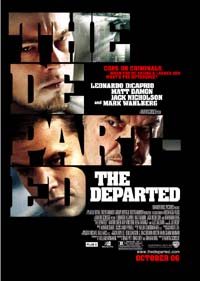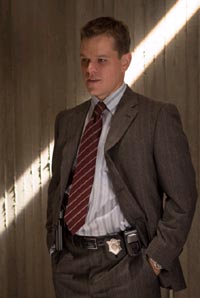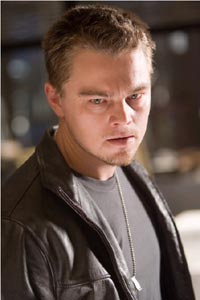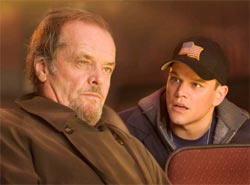 |
The Departed (2006, Dir. Martin Scorcese):
“I don’t want to be a product of my environment. I want my environment to be a product of me.”
— Jack Nicholson, The Departed
So says Jack, and so one can say of Martin Scorcese. His career has run the gamut, from taxi drivers who roam the mean streets to kings of comedy who stumble about after hours and goodfellas who hang out with casino wiseguys. And let’s not forget the unexpected star turns by Christ and the Dalai Lama. Through it all one thing has remained constant: a Scorcese picture will grab you round the neck and wring you until you are dry. Just as Quentin Tarantino has become a bit of a self-parody with his grindhouse expertise, Scorcese is the caricature of the restless auteur, waxing rhapsodic about the greatness of cinema history with every frame he shoots, never missing a chance to pull out a fancy camera move or ratchet up a climactic moment until it screams with operatic intensity. Blame it on his Italian-American Catholic upbringing if you must, but of the baby boomer generation of directors he broke in with (Lucas, Spielberg, Coppola), Scorcese is the one with the hustle and relentlessness of a boxer, and audiences have been happy to be pummeled, Jake LaMotta-like, into submission.
Forever cycling between the mainstream prestige picture (Gangs of New York, The Aviator), the gangster epic (Goodfellas and Casino), and the low-down remake or update (The Color of Money, Cape Fear), Scorcese has spun the wheel yet again and come up with a canny mix: a remake of a critically acclaimed Hong Kong pulp thriller, Infernal Affairs. At once a regurgitation and a return, it’s a chance for him to indulge in some down-and-dirty genre dealings (as he himself ruefully notes, it’s the first film he’s directed that “has a plot”), while falling back on the gangster milieu that secured fame for him in the past. Not surprisingly, critics everywhere are heralding this one as a “return to form.”
 |
The remade plot, which is remarkably faithful to the original, is an ingenious cat-and-mouse setup with two rats as the main players: Billy Costigan (Leonardo Dicaprio) and Colin Sullivan (Matt Damon). Costigan is the good cop with the troubled family background who volunteers to get kicked out of the force and infiltrate the inner circle of Irish crime lord Frank Costello (Nicholson), while Sullivan is a Costello stooge who has worked his way up into the police department’s Internal Affairs division. Both men become aware of the other’s existence, and in fine potboiler style, the two of them race against time to expose the other first.
While Infernal Affairs rates highly with many critics as the best example of post-1997 Hong Kong cinema, I’m mostly unmoved by the film — it’s a chilly exercise that cuddles up to plot dexterity at the expense of emotional involvement, although it has a neat didn’t-see-that-coming sting to its conclusion. Some of that chilliness infects The Departed despite Scorcese’s efforts to froth things up with back story. The first 40 minutes or so of the film flows by in a workmanlike rush, as Scorcese, working with the redoubtable editor Thelma Schoonmaker, fills us in on one plot detail after another. It’s never less than watchable, but one gets the sense that Scorcese is on autopilot; he’s at his best when he’s building up to crescendoes, the showman mounting his rat-tat-tat set pieces rather than the rigorous helmer making the slow build.
But once the rat hunt (and those set pieces) kick in, the film takes off, and at its best it offers pleasures that Infernal Affairs never even thought to shoot for. A rendezvous at a movie theater becomes a nail-biting foot chase that ends with a shocking, accidental assassination. A strategy meeting between police departments becomes a Mamet-esque flurry of barbs and power jockeying. An innocuous conversation at a diner turns to ribald tangents involving nuns. Forsaking his usual turf of Italian criminals, Scorcese evokes a pungent, humorous vision of the Irish gangster life (this movie could be a continuation of Gangs of New York: one can see the Irish immigrants of that picture eventually hightailing it over to the Southie side of Boston). Here, family and community seep into everything, and the plot’s machinations seem to spring from that fact — everyone is simultaneously on the make and on the outside, and an upstanding cop might consort freely with his drug dealer cousin while the big crime boss might take an interest in a low-life in hopes of making something legit out of him. The very idea that someone’s allegiences can be identifiable seems a joke, inflating the rat hunt, with its bewildering assortment of traced cell phone calls, smudgy surveillance footage, and insinuating accusations between cops and baddies, into a near-parodic chasing of tails and identities.
But lest you think there’s something deep going on here, rest assured that Scorcese is back on his hallowed ground of wiseguys and smart-alecky cops, where banter becomes a profane game of one-upmanship, and the ultimate insult is to compare a guy to a certain part of the female anatomy. The number-one offender in this regard is Mark Wahlberg’s hilarious Sergeant Dignam, one of only two men on the force who knows Costigan’s secret. Wahlberg is the film’s version of a firecracker, appearing on the scene just long enough to blow up in everyone’s faces and leave a trail of pungent smoke behind. “Who the fuck are you?” an uppity police tech snaps at him, and Dignam spits right back, “I’m the guy who does his job. You must be the other guy.” Taking what could have been a one-note part and pumping it with hell-with-you charm, he’s a clear standout, stealing scenes even from the hammy Alec Baldwin (who knows a thing or two about firecrackers from Glengarry Glen Ross, and seems to have teleported in from that movie).
 |
While Scorcese has filled his cast with savvy character actors, including Martin Sheen as the weary, wary Captain Queenan (the only other man on the force who knows Costigan’s secret) and Roy Winstone as the hangdog French, Costello’s second-in-command, it’s DeCaprio who owns the movie, remarkably enough. In Infernal Affairs, the undercover cop was played by Tony Leung, and ordinarily a Leung-DeCaprio acting showdown would be no contest, yet Leung was hamstrung by his role and turned in a flat performance, while DeCaprio breathes anxiety and humanity into his character. He’s built his career on playing confident tricksters (Titanic, Aviator, Blood Diamond), but sweaty desperation becomes him. Not completely convincing as a grown man, he’s expert at playing men-children, and Costigan makes one doozy of a man-child: burning with the need to prove himself, callow enough to believe in justice and jaded enough to know that happy endings are not guaranteed, his eyes betraying his paranoia even as he radiates braggadocio.
If there’s one disappointment among the cast, it’s Damon as Sullivan. William Monahan’s script does him no favors; as played by Andy Lau in the original Infernal Affairs, the mob mole in the police force is a comic-tragic figure, seduced by the prospect of doing good as much as any good man has been seduced by the lure of doing bad, but in The Departed he’s a black-hat bad guy, and Damon does little to suggest any inner life or turmoil that goes against that grain — doubly surprising since he’s proven adept at playing duplicitous anti-heroes (Good Will Hunting, The Talented Mr. Ripley). He’s even saddled with a dicey subplot in which he becomes involved with psychologist Madolyn (Vera Farminga, who gets to show a bit more pluck than the vacuous Kelly Chan in the original) while Madolyn is tending to what ails DeCaprio’s Costigan — a love triangle that is a bit too convenient, and never played out convincingly.
 |
And Jack Nicholson? Ah, Jack. As you would expect, Jack is mostly Jack, although he softpedals his usual grinning malevolence at the start of the film. But as Costello ostensibly descends into “crazy mode” as the story wears on (very convenient), Jack falls back on his sheer Jack-ness, snorting coke and hookers’ breasts in a scene drenched in the blood-red hues of a Hugh Hefner bedchamber, and that’s when he’s not playing around with a severed hand, or showing off a dildo to Damon while watching a porn movie. Like Jack, Scorcese just can’t resist leaving well enough alone: while the first two hours of The Departed are bracing and lean, the film flounders in the final act, as one bloody climax follows another, with a concluding murder that comes without windup or payoff, and all but butchers the original movie’s more psychologically complex denouement. And then there’s that howler of a final shot: a rat crawling on a window ledge, with Boston City Hall in the distance! The Departed may grab its share of awards for Scorcese, and there’s much to admire in its construction, but can someone remind him that every film need not devolve into bad opera?


Comments
Meiser Lee
I agree the one disappointment among the cast is Damon...he wasn't necessarily pulling off the role. Runner up in that would have to be Jack, […] Read MoreI agree the one disappointment among the cast is Damon...he wasn't necessarily pulling off the role. Runner up in that would have to be Jack, specifically because he seems to only rely on his 'jack-ness'. I was pretty surprised to find that I liked DiCaprio in this movie. I kind of shuddered when I heard he was in it, but he played, in my opinion anyhow, the best character in it. Read Less